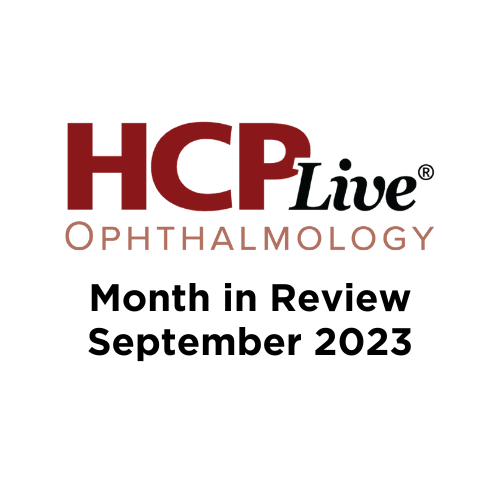Ophthalmology Month in Review: September 2023
Our ophthalmology month in review for September 2023 highlights our top stories in retina, the latest news from the FDA, and insights into the evolving specialty landscape.

Each month, our editorial staff compiles a recap of the top news in ophthalmology from the past month. Our September 2023 month-in-review features a trio of top stories on retinal disease, new approvals and warnings from the US Food and Drug Administration (FDA), and interesting changes to the ophthalmology landscape.
Top Stories
As a hallmark of our coverage in ophthalmology, a trio of stories on retinal diseases marked our most popular in September. The covered topics ranged from metformin decreasing the likelihood of dry AMD, to how antibiotic exposure may be associated with AMD development, and how the second FDA-approved agent for geographic atrophy (GA) continues to show benefit at 2 years.
Metformin Use Associated With Decreased Odds of Dry AMD
Results from a case-control study at The University of Chicago found metformin was associated with decreased odds of new-onset dry age-related macular degeneration. The analysis of nearly 200,000 AMD cases and matched controls showed any metformin use was associated with decreased odds of developing dry AMD. The protective effect remained for the cumulative 2-year doses of metformin of 1 to 270 g and 271 to 600 g.
“Ultimately, these data suggest a potential role for metformin in preventing dry AMD,” investigators wrote.
Antibiotic Exposure May Be Associated with AMD Development, Study Finds
Antibiotic exposure could be associated with the development of new-onset AMD. A case-control study of ≥300,000 AMD cases showed a frequency- and duration dependence, with a greater cumulative number of antibiotic prescriptions linked to increased odds of AMD.
“Our results suggest that use of fewer prescriptions, limiting total days of exposure, and choosing agents with appropriately narrow coverage may be important components of antibiotic stewardship to prevent AMD development,” investigators wrote.
Avacincaptad Pegol Significantly Slows Geographic Atrophy Growth at 24 Months
Positive 24-month topline results from the phase 3 GATHER2 clinical trial suggest the efficacy and safety of avacincaptad pegol intravitreal solution (IZERVAY) for the treatment of GA secondary to AMD.
As announced by Iveric Bio, monthly dosing of the complement C5 inhibitor met the primary trial objective, significantly slowing GA growth at 24 months, compared to sham. Every other month dosing showed similar reductions in the rate of GA growth
FDA News
Also in September, the FDA approved a new ophthalmic solution for the treatment of mydriasis, or dilation of the pupils, and additionally warned 8 companies for manufacturing and marketing unapproved eye drops.
FDA Approves Phentolamine Ophthalmic Solution for Pharmacologically-Induced Mydriasis
In September, the FDA approved phentolamine ophthalmic solution (RYZUMVI) 0.75% for the treatment of pharmacologically-induced mydriasis, produced by adrenergic agonists or parasympatholytic agents.
Evaluated in the MIRA clinical trial group, the percentage of eyes returning to ≤0.2 mm from baseline pupil diameter was statistically significantly greater in the phentolamine ophthalmic solution group versus placebo.
Granted to Ocuphire Pharma and Viatris Inc., the ophthalmic solution is expected to be commercially available in the first half of 2024.
CVS, Walgreens Among Companies to Receive FDA Warning for Marketing Unapproved Eye Drops
The FDA circulated warning letters to 8 companies for manufacturing unapproved ophthalmic drug products in violation of federal law, including CVS Health and Walgreens.
Per the letter, these companies illegally marketed their eye products to treat conditions, including conjunctivitis, cataracts, and glaucoma. As part of an agency-wide effort to protect against potentially harmful ophthalmic products, many of the FDA letters also cited quality issues related to product sterility.
State of Care
To round out our September month in review, we highlight 2 stories on the current state of the field in ophthalmology. As the treatment landscape continues to evolve, clinical practice will undergo changes as well. In these top stories, the topics ranged from a discussion on the cost of anti-VEGF medications to the evolving role and use of artificial intelligence in ophthalmology.
Costlier AMD Prescriptions Linked to Manufacturer Payments to Ophthalmologists
A cross-sectional analysis of Medicare Part B data spending shows ophthalmologists who received drug manufacturer funding were more likely to select costlier therapies for AMD.
In particular, they observed a reduced likelihood of prescribing bevacizumab (Avastin) versus ranibizumab (Lucentis) or aflibercept (Eylea), despite bevacizumab being significantly less costly on off-label use per 2020 averages.
The estimated Medicare spending on AMD therapies had ophthalmologists who received manufacturer payments prescribed similarly to those who did not would have been more than $642 million total from 2013 – 2019, or a 2% savings.
Seeing is Believing: The Role of Artificial Intelligence in Ophthalmology
The use of artificial intelligence use is growing globally and the field of medicine is no stranger to this change. From the use of imaging technologies to large learning model chatbots, ophthalmology could be the center of this transformation.
Given the rapidly expanding scope of AI, it may be necessary for the specialty to overcome ethical concerns and issues with interpretation to safeguard patient outcomes. In this feature, experts described the rapidly changing landscape and discussed how the field will shift in the coming decades.